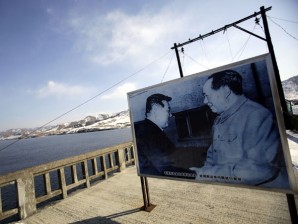
In this Feb. 7, 2013 photo, a picture of Mao Zedong, founder of the People’s Republic of China, right, and North Korea’s late leader Kim Il Sung is displayed on the Hekou Bridge, which once linked China and North Korea before it was bombed in the 1950′s during the Korean War, in Hekou, China. China’s patience with North Korea is wearing thin, and a widely-expected nuclear weapons test by the latter could bring that frustration to a head. AP Photo/Eugene Hoshiko
MANILA, Philippines—If Kim Il-Sung, founder of North Korea, were alive today, he would not allow his country and South Korea to come as close to another war as they have done now, according to former House Speaker Jose de Venecia.
Speaking at the International Conference of Asian Political Parties (Icapp) in Phnom Penh, Cambodia, on Wednesday, De Venecia said he remembered Kim telling him in July 1990 that a new conflict on the Korean Peninsula would bring no benefit to either North or South but instead devastate both countries.
“With our weapons, we can destroy the South. But we in the North will also be destroyed. So what is there to gain in waging another Korean war?” De Venecia quoted Kim as telling him at the North Korean leader’s home outside Pyongyang in answer to his question whether the North intended to invade the South.
Korean War
The 1950-53 Korean War killed three million to four million people and generated four million refugees from a peninsula with only 30 million people.
North Korea and South Korea, separated by a demilitarized zone at the 38th parallel, technically remains at war with each other, as the conflict did not end in a peace treaty but in an armistice that only halted hostilities between the two countries.
That status makes Saturday’s declaration by the North of a state of war with the South mean nothing more than bellicose rhetoric intended to win concessions from the United States and its allies who are trying to make it give up its nuclear weapons program.
On Thursday the North warned that it had authorized its military to strike US targets with small nuclear weapons, but experts believe Pyongyang does not yet have the ability to launch nuclear-tipped missiles, although they admit that its other nuclear capabilities are not fully known.
Diplomatic relations
De Venecia, then acting chair of the House committee on foreign relations, led a congressional delegation to Pyongyang in a bid to cut North Korean support to the communist New People’s Army (NPA).
The visit by De Venecia’s delegation led to the opening of diplomatic relations between the Philippines and North Korea.
De Venecia, who served five terms as House Speaker, has led Icapp since his retirement from electoral politics.
The organization has 318 ruling and opposition parties in 52 Asian countries as members.

